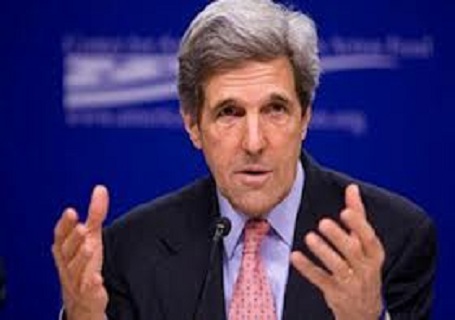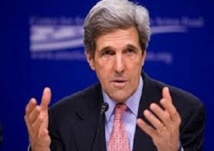Washington's new diplomatic bid is aimed at uniting Iraq's fractious leaders and repelling insurgents whose lightning offensive has displaced hundreds of thousands, alarmed the world and put Prime Minister Nuri al-Maliki under growing pressure.
Kerry flew out of Washington on Saturday, headed to Amman, then Brussels and Paris.
While Kerry is expected to travel to Iraq for his second visit since taking over as secretary of state in early 2013, it was not known when he would do so.
Washington had initially favoured Maliki when he first became prime minister in 2006 as he was seen to be cracking down on Shiite militias while reaching out to Sunni leaders.
But in recent months, he has made increasingly sectarian moves, triggering calls from US leaders to be the man for all Iraqi people -- including Sunnis, Kurds and Christians.
- 'We gave Iraq the chance' -
While American leaders have stopped short of calling for Maliki to step down -- arguing that it is up to the Iraqis to choose their own leaders -- they have left little doubt that they feel the Shiite premier has squandered the opportunity to rebuild his country since US troops withdrew in 2011.
"We gave Iraq the chance to have an inclusive democracy. To work across sectarian lines, to provide a better future for their children," President Barack Obama told CNN on Friday.
"Unfortunately, what we've seen is a breakdown of trust."
Obama this week unveiled a plan to send 300 military advisors back to Iraq, but he made it clear that without political changes, the United States would not invest lives and resources in the country US forces invaded in 2003.
In a sign the broad alliance of jihadists and anti-government elements behind the assault may be fracturing, internecine clashes killed 17 fighters in northern Iraq.
Security forces announced they were holding their own in several areas north of Baghdad, but officials said insurgents led by the Islamic State of Iraq and the Levant (ISIL) group seized one of three official border crossings with Syria.
The takeover came a day after 34 members of the security forces were killed in the border town, giving the fighters greater cross-border mobility into conflict-hit Syria.
The seizure of Al-Qaim leaves just one of three official border crossings with Syria in the hands of the central government. The third is controlled by Kurdish forces.
Anti-government fighters already hold parts of the western province of Anbar, which abuts the Syrian border, after taking all of one city and parts of another earlier in the year.
- Internecine clashes -
ISIL aims to create an Islamic state that will incorporate both Iraq and Syria, where the group has become a major force in the rebellion against President Bashar al-Assad.
Seventeen fighters were killed in Friday clashes between ISIL and the Army of the Men of the Naqshbandiyah Order (JRTN), another Sunni insurgent group, in militant-held territory in northern Kirkuk province.
The Sunni insurgents driving the offensive are made up of a broad alliance of other groups, such as loyalists of now-executed dictator Saddam Hussein.
Analysts say it is unclear if the alliance can survive given its disparate ideologies.
Northeast of Baghdad, shelling targeting militant-held villages near the town of Muqdadiyah killed six civilians, police and a doctor said.
In Baghdad, thousands of armed fighters loyal to powerful Shiite cleric Moqtada al-Sadr paraded in the Sadr City district, vowing to fight the offensive which began on June 9.
Rank upon rank of fighters, wearing mostly camouflage but with some in black, carried Kalashnikov assault rifles, shotguns, sniper rifles, light machineguns and rocket launchers.
Some carried Iraqi flags, while others held signs with messages including "We sacrifice for you, O Iraq," "No, no to terrorism," and "No, no to America."
Similar parades were held in large southern cities in the Shiite heartland.
UN aid agencies said they were rushing supplies to Iraq to help more than one million people displaced by the latest violence and unrest earlier this year.
Turkey, meanwhile, said it will provide fuel to Iraq's Kurdistan region to make up for a shortage caused by the militant offensive that has closed Iraq's biggest oil refinery at Baiji.
-------------------------------------------------------------------------------
Kerry flew out of Washington on Saturday, headed to Amman, then Brussels and Paris.
While Kerry is expected to travel to Iraq for his second visit since taking over as secretary of state in early 2013, it was not known when he would do so.
Washington had initially favoured Maliki when he first became prime minister in 2006 as he was seen to be cracking down on Shiite militias while reaching out to Sunni leaders.
But in recent months, he has made increasingly sectarian moves, triggering calls from US leaders to be the man for all Iraqi people -- including Sunnis, Kurds and Christians.
- 'We gave Iraq the chance' -
While American leaders have stopped short of calling for Maliki to step down -- arguing that it is up to the Iraqis to choose their own leaders -- they have left little doubt that they feel the Shiite premier has squandered the opportunity to rebuild his country since US troops withdrew in 2011.
"We gave Iraq the chance to have an inclusive democracy. To work across sectarian lines, to provide a better future for their children," President Barack Obama told CNN on Friday.
"Unfortunately, what we've seen is a breakdown of trust."
Obama this week unveiled a plan to send 300 military advisors back to Iraq, but he made it clear that without political changes, the United States would not invest lives and resources in the country US forces invaded in 2003.
In a sign the broad alliance of jihadists and anti-government elements behind the assault may be fracturing, internecine clashes killed 17 fighters in northern Iraq.
Security forces announced they were holding their own in several areas north of Baghdad, but officials said insurgents led by the Islamic State of Iraq and the Levant (ISIL) group seized one of three official border crossings with Syria.
The takeover came a day after 34 members of the security forces were killed in the border town, giving the fighters greater cross-border mobility into conflict-hit Syria.
The seizure of Al-Qaim leaves just one of three official border crossings with Syria in the hands of the central government. The third is controlled by Kurdish forces.
Anti-government fighters already hold parts of the western province of Anbar, which abuts the Syrian border, after taking all of one city and parts of another earlier in the year.
- Internecine clashes -
ISIL aims to create an Islamic state that will incorporate both Iraq and Syria, where the group has become a major force in the rebellion against President Bashar al-Assad.
Seventeen fighters were killed in Friday clashes between ISIL and the Army of the Men of the Naqshbandiyah Order (JRTN), another Sunni insurgent group, in militant-held territory in northern Kirkuk province.
The Sunni insurgents driving the offensive are made up of a broad alliance of other groups, such as loyalists of now-executed dictator Saddam Hussein.
Analysts say it is unclear if the alliance can survive given its disparate ideologies.
Northeast of Baghdad, shelling targeting militant-held villages near the town of Muqdadiyah killed six civilians, police and a doctor said.
In Baghdad, thousands of armed fighters loyal to powerful Shiite cleric Moqtada al-Sadr paraded in the Sadr City district, vowing to fight the offensive which began on June 9.
Rank upon rank of fighters, wearing mostly camouflage but with some in black, carried Kalashnikov assault rifles, shotguns, sniper rifles, light machineguns and rocket launchers.
Some carried Iraqi flags, while others held signs with messages including "We sacrifice for you, O Iraq," "No, no to terrorism," and "No, no to America."
Similar parades were held in large southern cities in the Shiite heartland.
UN aid agencies said they were rushing supplies to Iraq to help more than one million people displaced by the latest violence and unrest earlier this year.
Turkey, meanwhile, said it will provide fuel to Iraq's Kurdistan region to make up for a shortage caused by the militant offensive that has closed Iraq's biggest oil refinery at Baiji.
-------------------------------------------------------------------------------









 Home
Home Politics
Politics











